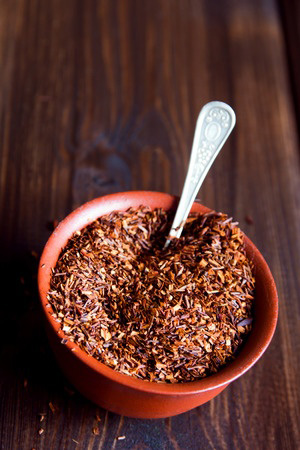Rooibos is a herb and has been popular as a tea for many generations in Southern Africa. The plant known as Aspalathus linearis is found in an area of the Western Cape province of the country but today enjoys popularity all around the world.
Technically, rooibos is not a tea but is an infusion made from oxidized leaves. It is usually enjoyed hot with lemon and sugar, though it can also be enjoyed with milk or in ice-tea form. Rooibos has a distinctive red color that sets it apart from white, green or black tea and this is what allows it to be enjoyed in a number of different ways.
(You can get green rooibos tea which undergoes a more traditional fermentation process but this is less common.)
Caffeine Free
 Many people will switch to green tea because they want to avoid caffeine. What they often don’t realize though, is that the majority of green teas still do contain caffeine. In fact, some green teas actually contain more caffeine than black tea, while others include other stimulants (called xanthines) alongside the caffeine.
Many people will switch to green tea because they want to avoid caffeine. What they often don’t realize though, is that the majority of green teas still do contain caffeine. In fact, some green teas actually contain more caffeine than black tea, while others include other stimulants (called xanthines) alongside the caffeine.
Rooibos red tea on the other hand is actually caffeine free and is a genuinely natural alternative to caffeinated hot beverages. This is a good thing for anyone who finds that caffeine interferes with their sleep, or that it causes anxiety and headaches. Even if you don’t notice any side effects from caffeine, it’s worth noting that it is addictive and morning grogginess can actually be caused by caffeine withdrawal!
Rooibos also contains fewer tannins, which takes away the bitterness associated with some teas. For those who find tea a little strong and prefer theirs sweeter, that’s another tick in the ‘win column’ for rooibos.
Antioxidants
Like many teas, rooibos is high in antioxidants which can help to slow ageing and prevent cancer. In green tea, the primary beneficial flavonoids are catechins like epigallocatechin gallete. In rooibos, these benefits come from aspalathin and nothofagin. That’s more good news for your rooibos-loving friends, seeing as studies suggest aspalathin is even more effective at combating free radicals (1). Despite green tea getting all the attention for its antioxidant properties then, rooibos may actually have it beat. Presumably green tea just has the better PR guy…
Note that red rooibos tea seems to be slightly inferior to green rooibos tea when it comes to the antioxidant properties.
Heart Health
Whereas black tea is a vasoconstrictor, meaning that it can increase blood pressure and exacerbate migraines (stop drinking tea to cure hangovers!), rooibos is actually a vasodilator. That means that it helps to relax the blood vessels so that they increase in diameter. This in turn allows blood to flow more easily around the body, immediately lowering blood pressure and reducing the risk of cardiovascular disease. This also means that rooibos might have indirect benefits for preventing type 2 diabetes.
Vitamins and Minerals
On top of all this, rooibos tea is also high in a number of useful minerals including calcium, iron, potassium, copper, fluoride, manganese and zinc.
Next time you’re looking for an alternative to regular tea, consider going red instead of green!



